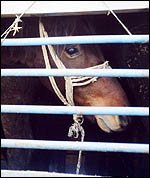 French
turn away from horsemeat
French
turn away from horsemeat

Despite a downturn in
the consumption of horsemeat in
Recent figures showing that the consumption of horsemeat in
The consumption of horsemeat in
The decrease in horsemeat consumption in
But the Ethical Association of the Horse, a welfare organisation which has a
range of mottos all enforcing the view that a horse ought not to be eaten,
maintains that as many as 850 horses are still eaten each day in France (as many
as 310,000 every year).
The association says that the status of the horse has changed and that he has
become a companion rather than a slave.
“Since man has created a special bond with the horse, through sport and
leisure, we should respect its entity.”
The association's brief continues: “We ask those who do not have the immense
privilege of having a horse as a companion to respect this extraordinary
creature, noble by its excellence . . . which through the centuries has shared
not only man’s work . . . but also his follies of war and even his fight for
liberty.”
The history of the consumption of horsemeat has trodden a stony path in
The nutritional value of the meat and the low cost quickly swayed public
opinion, and by 1866 the first specialist horse butcher had appeared in the
country's capital.
Nowadays times are changing all over the world. The status of animals has
changed significantly and celebrities everywhere are championing their cause.
Animal welfare organisations in
There was outrage recently, when the national stud in
But many in the industry claim that the majority of heavy horses bred in
The Ethical Association of the Horse dismisses this claim, arguing that if
anything, it would have contributed to the disappearance of lighter breeds in
favour of fleshier animals. Above all, it stands by its motto, whatever the size
of the horse.
“Non un Cheval, ça ne se mange pas” — A horse is not for eating.
End